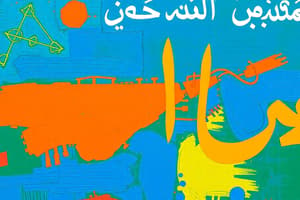Podcast
Questions and Answers
ما هي الخطوة الأساسية في تحليل الخطاب البلاغي؟
ما هي الخطوة الأساسية في تحليل الخطاب البلاغي؟
- تقييم مصداقية المؤلف
- تحديد أنواع الحجج المستخدمة (correct)
- تحليل الألفاظ والتراكيب
- استخراج الأفكار الرئيسية
ما هو الدور الأساسي للأدب العربي في تشكيل الهوية العربية؟
ما هو الدور الأساسي للأدب العربي في تشكيل الهوية العربية؟
- ينقل قيم المجتمع العربي
- يساهم في نشر اللغة العربية
- يعكس التراث الثقافي العربي
- جميع ما سبق (correct)
ما هي الأساليب التعليمية التي قد يستخدمها المعلمون في الصف الثالث الثانوي؟
ما هي الأساليب التعليمية التي قد يستخدمها المعلمون في الصف الثالث الثانوي؟
- جميع ما سبق (correct)
- الأنشطة العملية وتكنولوجيا التعليم
- لا شيء مما سبق
- المحاضرات والمناقشات الجماعية
ما هي الأهداف الرئيسية لتعليم الشعر في الصف الثالث الثانوي؟
ما هي الأهداف الرئيسية لتعليم الشعر في الصف الثالث الثانوي؟
ما هي أهم الموضوعات التي تعكسها النصوص الأدبية العربية في الصف الثالث الثانوي؟
ما هي أهم الموضوعات التي تعكسها النصوص الأدبية العربية في الصف الثالث الثانوي؟
ما هي أبرز السمات الأسلوبية للنصوص الشعرية في اللغة العربية؟
ما هي أبرز السمات الأسلوبية للنصوص الشعرية في اللغة العربية؟
Which one of these is the most correct?
Which one of these is the most correct?
Which one of these is the most correct?
Which one of these is the most correct?
Which one of these is the most correct?
Which one of these is the most correct?
Which one of these is the most correct?
Which one of these is the most correct?
Flashcards are hidden until you start studying
Study Notes
Arabic Language, Rhetoric, Literature, Secondary Schools, and Poetic Education in the Third Grade of Secondary School
The third grade of secondary school is a crucial period in students' learning journey where they develop their understanding of various subjects, including Arabic language, rhetoric, literature, and poetic education. This stage aims to strengthen their foundational knowledge laid down during earlier grades while exploring new concepts related to these subjects. In this article, we will discuss how these disciplines interrelate and contribute to a comprehensive education plan for students in the third grade of secondary school.
Arabic Language
Arabic language, being one of the oldest languages with a rich history spanning over a thousand years, plays a significant role in developing communication skills among students. At the third grade level, students continue to enhance their proficiency in reading, writing, comprehension, grammar, syntax, vocabulary building, and pronunciation. They become more adept at analyzing texts, writing essays, and expressing their ideas through oral presentations. Additionally, they familiarize themselves with Arabic literature and help them learn about different cultures within the Islamic world.
Rhetoric
Rhetoric education focuses on teaching students the art of persuasion through effective usage of language, argument development, and public speaking strategies. During the third grade, students begin to understand the basics of rhetorical analysis, which involves identifying arguments made by authors and assessing their validity based on logos, ethos, and pathos. Students also practice constructing persuasive speeches and engaging in structured debates to cultivate critical thinking, empathy, and effective communication.
Literature
Literature, specifically Arabic literature, has played an essential role in shaping the Arab culture and identity. In the third grade, students explore classic texts from renowned Arab writers and poets, gaining insight into the historical contexts and themes embedded within the works. These literary pieces often showcase aspects such as love, friendship, social injustice, and human experiences, providing students with valuable lessons that foster empathy and emotional intelligence.
Secondary Schools and Educational Institutions
In many countries around the world, secondary schools serve as pivotal institutions where students receive specialized training tailored to their interests and aptitudes. During the third grade, students often attend classes led by experienced teachers who utilize diverse instructional methods to facilitate learning. Some common approaches may include lectures, group discussions, hands-on activities, and technology integration.
Poetic Education in the Third Grade of Secondary School
Poetry education in the third grade of secondary school aims to instill a love for the language and its rich literary heritage. This form of education encourages students to analyze and interpret poetic texts, focusing on the structure, rhyme schemes, and metaphors used by poets. It also helps students understand and appreciate the historical and cultural significance of poetry as an art form.
Conclusion
In conclusion, the third grade of secondary school encompasses a variety of disciplines that form the foundation of a well-rounded education. By mastering the Arabic language, understanding the principles of rhetoric, delving into the depths of Arabic literature, and engaging with poetic education, students develop critical thinking, effective communication, and cultural awareness skills that are vital for their personal and professional growth. As they progress through their academic journey, these competencies will continue to shape their perspectives and contribute to the development of a more informed and empathetic society.
Studying That Suits You
Use AI to generate personalized quizzes and flashcards to suit your learning preferences.




